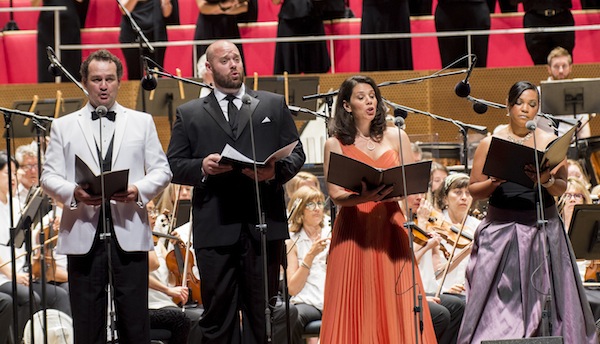Grant Park Music Festival wraps season with timely Beethoven

With Chicago’s gun violence off the charts and last week’s tragic events in Charlottesville exacerbating the roiling political divisions and social unrest across the country, the Grant Park Music Festival’s selection of Beethoven’s Symphony No. 9 to close its season couldn’t have been more timely.
Though scheduled over a year ago, Beethoven’s epic paean to brotherhood in the vocal “Ode to Joy” seems like especially serendipitous programming at a time when many people seem more interested in violent protest than sharing a common humanity.
Clearly, the timing was not lost on Carlos Kalmar, festival artistic director and principal conductor. In his introduction Friday night at the Pritzker Pavilion, Kalmar noted how the lakefront summer concert series draws people of all backgrounds together to enjoy great music and “share Beethoven’s message of brotherhood.”
A peak of Enlightenment art, Beethoven’s mighty Ninth seems to have lost some of its revered place as repertorial cornerstone over the past two decades–perhaps due to too many lackluster performances tied to galas and special occasions. Also the expense of booking four singers for less than thirty minutes of music is likely a factor in these budget-conscious times.
Considering the track record of Kalmar and the Grant Park Orchestra in music of Beethoven, one looked forward to a fresh, insightful performance to close the festival’s season. Yet after a summer of consistently inspired concerts, Friday night’s Beethoven proved surprisingly uneven.
The opening movement was flat and perfunctory, lacking the requisite dramatic tension and sense of expectant mystery that should unfold this 80-minute journey. The Scherzo went better with incisive rhythmic point, the flowing lines of the trio nicely contrasted.
The Adagio was undeniably a disappointment. Kalmar’s penchant for fast tempos in Beethoven slow movements here felt misjudged, the performance seeming to skate over the surface of some of the most profound music ever put to paper. The orchestra playing sounded uncharacteristically tired and unfocused, as well as grievously underrehearsed with balances left to sort themselves out.
Aided by a fine vocal quartet, the choral finale managed to provide a much-needed lift, with Kalmar building the majestic closing section to a fiery coda. Russell Braun delivered an aptly dramatic bass solo and Brendan Tuohy served up a nicely jaunty take on the tenor passage in the “Turkish” section. Mezzo Allyson McHardy and soprano Janai Brugger provided apt gleam at the high end, though the latter sounded stretched in her top register.
The most impressive element of this mixed Beethoven outing was provided by the Grant Park Chorus. Under the direction of guest chorus director Benjamin Rivera, the ensemble sang with bracing clarity and rich, resplendent vocalism.
Oddly, it was the Brahms choral rarity on the short first half that received the more consistent advocacy. The Schicksalslied (Song of Fate) is set to a Friedrich Hölderlin poem that contrasts the infinite joys of heaven with the manifold miseries of life on Earth.
Kalmar led a glowing, beautifully shaped performance that showed the close kinship of this music to Brahms’ German Requiem. Here too, the choral singing was first-class, conveying the soothing solace with rapt, elevated expression.
The program will be repeated 7:30 p.m. Saturday. gpmf.org
Posted in Performances




